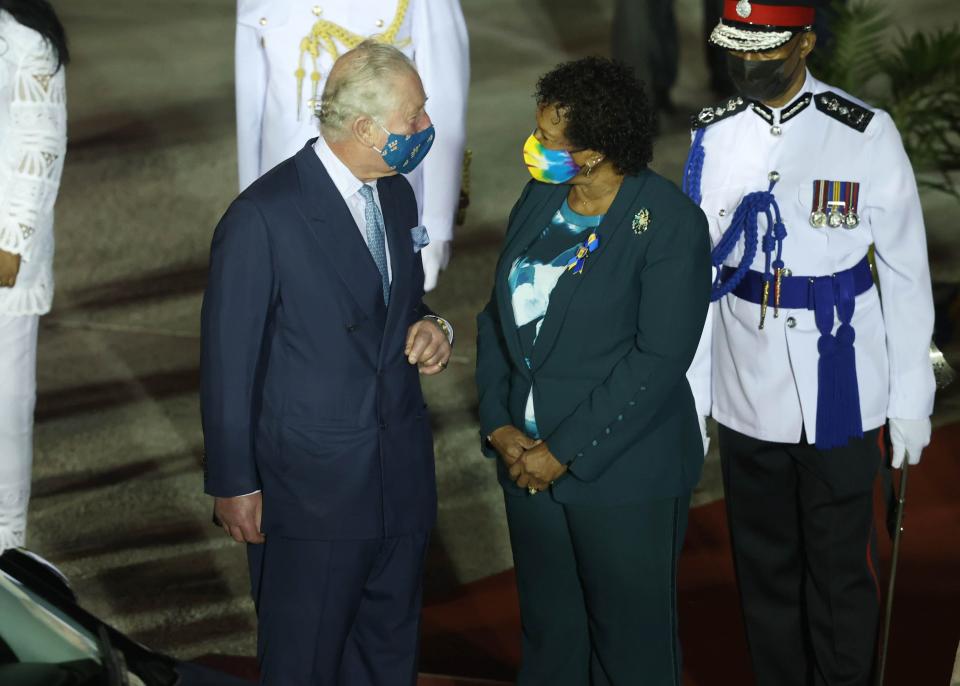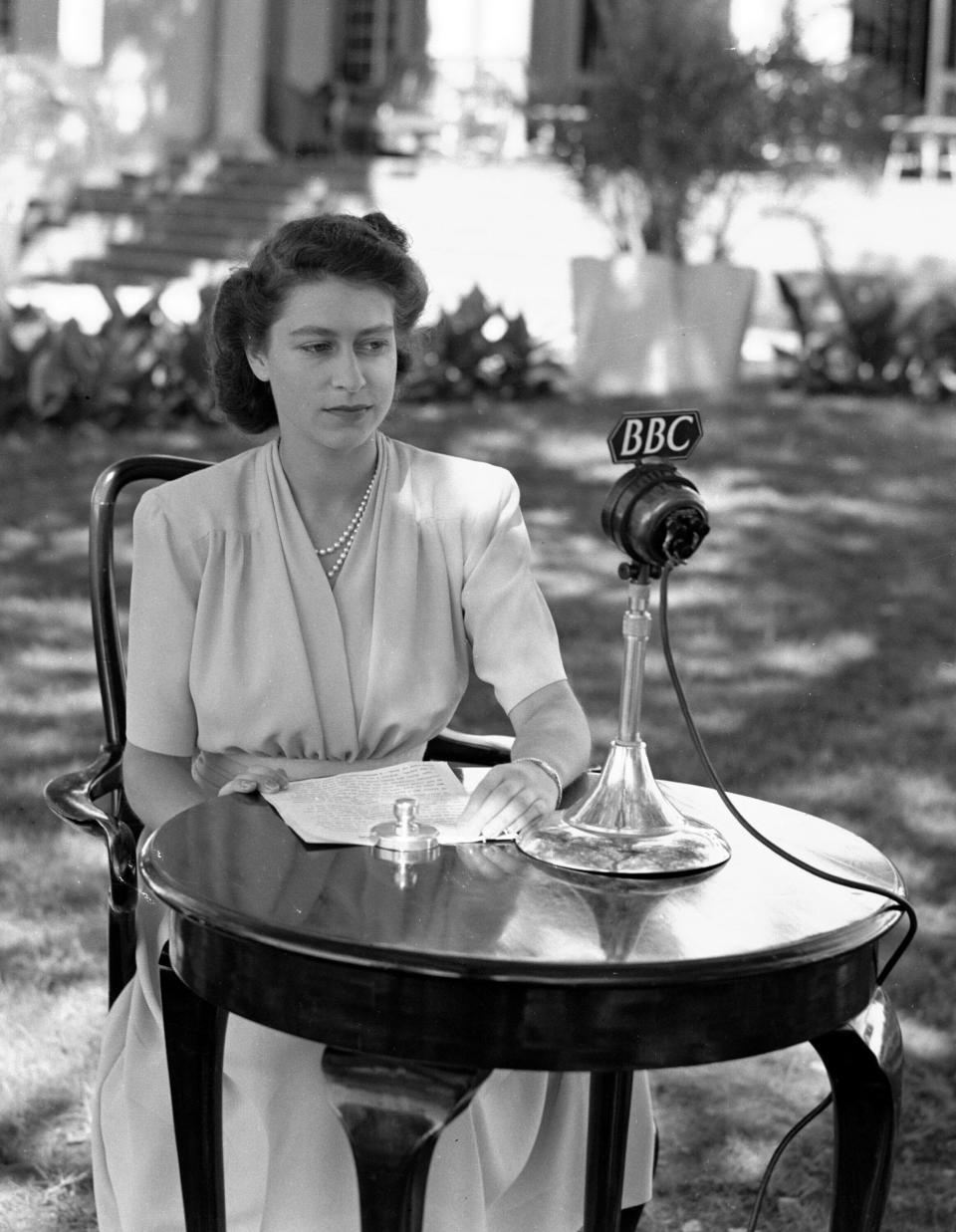Queen Elizabeth's death stirs debate about colonialism, slavery and British racism
- Oops!Something went wrong.Please try again later.
The trip was supposed to be the equivalent of a victory lap: A weeklong ceremonial romp through the Caribbean to celebrate Queen Elizabeth II’s 70th year as a monarch.
But the March trip by Britain’s Prince William and his wife, Kate, the Duchess of Cambridge, was marred by protests, calls for reparations and canceled stops. Demonstrators demanded formal apologies from the royal family for its links to slavery.
“During her 70 years on the throne, your grandmother has done nothing to redress and atone for the suffering of our ancestors that took place during her reign and/or during the entire period of British trafficking of Africans, enslavement, indentureship and colonization,” wrote members of the Advocates Network Jamaica, a protest group.
As condolences and memorials emerge in the wake of the queen's death on Thursday, her passing also revived controversies surrounding her perceived lack of atonement for past sins of the royal family, ties to its colonial past and more recent racial embroilments.
"We do not mourn the death of Elizabeth because to us her death is a reminder of a very tragic period in this country and Africa's history," the Economic Freedom Fighters, a South African political opposition party, said in a statement. "During her 70-year reign as Queen, she never once acknowledged the atrocities that her family inflicted on native people that Britain invaded across the world."
Elizabeth died Thursday at age 96, bringing an end to the United Kingdom's longest-serving monarch. Her reign spanned 15 British prime ministers, starting with Winston Churchill, and 14 U.S. presidents.
Calls for reparation from former colonial powers have been occurring for generations. But the backlash against Britain ramped up in the wake of the 2020 shooting of George Floyd and subsequent Black Lives Matter global protests, said Kehinde Andrews, professor of Black studies at Birmingham City University in England.
Barbados in November 2021 removed the queen as its head of state, becoming the region’s newest republic. Six other Caribbean countries have signaled their intent to follow suit.
With Elizabeth’s death, some question whether England should even have a monarchy, Andrews said.
“It’s just the former British Empire,” he said. “Its time has passed, I think.”

Justin Hansford, law professor and director of the Thurgood Marshall Civil Rights Center at Howard University in Washington, D.C., said he was surprised to see "reparations" trending on his Twitter feed Thursday, as people took to the social media site to point out connections between the queen and Britain's colonial past.
The groundswell for slavery reparations for former British African and Caribbean colonies ramped up over the summer and will only amplify in the wake of Elizabeth's death, he said.
"This is a moment where the legacy of the British monarchy, and as a result of the British empire, is being discussed," said Hansford, who also sits on the U.N.'s Permanent Forum of People of African Descent. "That’s not something that happens every day on a global scale."
William and Kate's March trip, part of the queen’s international “platinum jubilee” celebrations, culminated in Jamaica when sign-wielding protestors gathered outside the British High Commission and more than 100 professors, dignitaries and other prominent citizens wrote an open letter to the royal family demanding an apology and reparations for slavery.
On that trip, William, Elizabeth’s grandson and at the time second in line to the throne, called slavery “abhorrent” during a dinner speech and said it “should have never have happened” – though notably stopped short of apologizing.
Some observers applauded the remarks, calling it a “landmark” step forward. But critics said it didn’t go far enough.
“Many of us are not charmed,” Rosalea Hamilton, an organizer with the Advocates Network Jamaica, told the Washington Post at the time. William’s speech “doesn’t rise to the level of a formal apology, which not only requires taking responsibility but a commitment to non-repetition and, of course, reparatory justice.”
The marriage of Prince Harry to Meghan Markle in 2018 also rekindled allegations of racism simmering for years at Buckingham Palace. After leaving the royal family and moving to California in 2020, the Duke and Duchess of Sussex sat for an interview with Oprah Winfrey. In the interview, Meghan said an unnamed person in the royal household questioned whether her son would be “too dark to represent the U.K.,” prompting William to later respond that the royal family was “very much not a racist family.”

Though allegations of racism within the royal family and Britain’s colonial past are separate issues, they are often intertwined.
In June 2021, a group of students voted to remove a portrait of Elizabeth hanging in a common room at Magdalen College at Oxford University in England over concerns that “depictions of the monarch and the British monarchy represent recent colonial history,” sparking a backlash from pro-monarchy leaders.
One of Elizabeth’s enduring legacies is how she managed to skirt controversy over her long and storied reign – from the brutal British suppression of the Mau Mau revolt in Kenya at the start of her reign in the 1950s to the recent revelations by Harry and Meghan – and emerge unblemished, said Marcus Ryder, professor of media diversity at Birmingham City University.
“Generally speaking, what has been amazing about the queen is that these controversies have swirled around her … and she’s been able to avoid any of them tarnishing her,” he said. “Whether her successor can do the same – who knows?”
Follow Jervis on Twitter: @MrRJervis.
This article originally appeared on USA TODAY: Queen Elizabeth and colonialism debate follow death of British monarch

